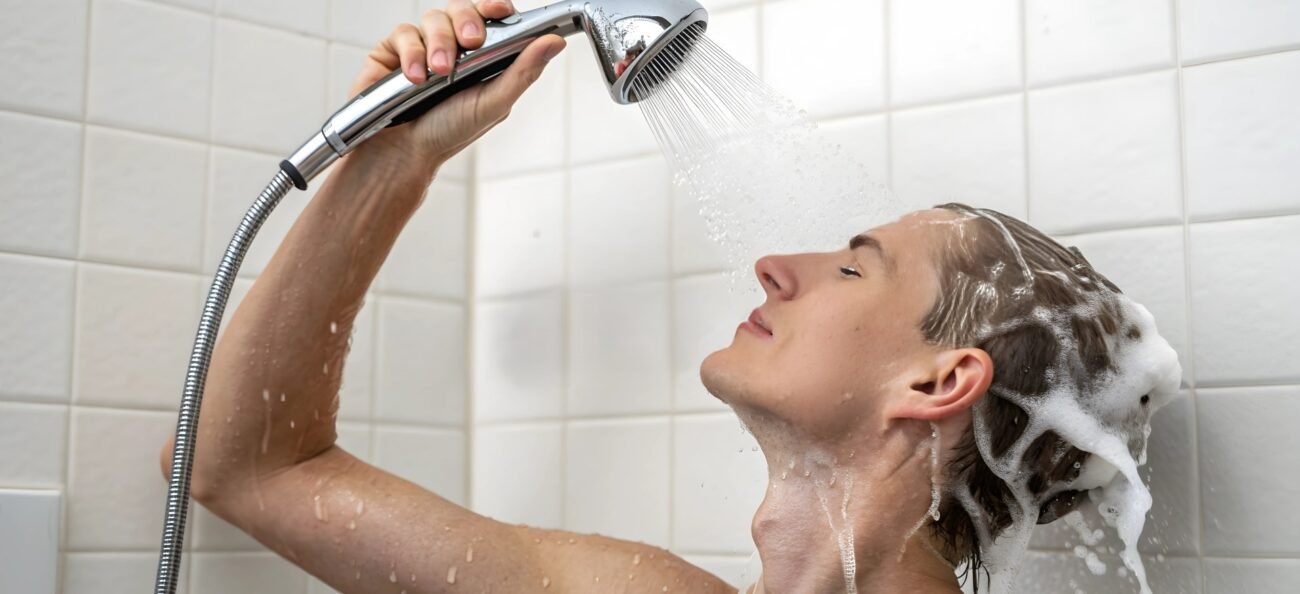Showering Habits have become a topic of renewed discussion, largely ignited by Primrose Freestone, a Senior Lecturer in Clinical Microbiology at the University of Leicester. Freestone argues for the hygienic superiority of morning showers, a stance that has garnered significant attention. Her reasoning centers on what accumulates on our bodies overnight and the often-overlooked role of bedding hygiene.
Freestone highlights that even if you shower before bed, your body continues to sweat throughout the night. This sweat, along with dead skin cells and skin microbes, gets deposited onto your bedsheets. A morning shower effectively removes these overnight accumulations, ensuring you start your day fresh and clean, especially if your bedding isn’t freshly laundered.
She emphasizes that this cleanse is crucial before putting on clean clothes, preventing the transfer of “night-acquired skin microbes” onto your attire. Furthermore, a morning shower reduces the amount of sweat available for odor-producing bacteria to feed on, potentially helping you smell fresher for longer throughout the day compared to someone who showered at night. This choice in showering habits can significantly impact your daily freshness.
A critical aspect of Freestone’s argument pertains to bedding contamination. She points out that the cleansing benefits of a night shower are significantly negated if bedding isn’t regularly washed. Odor-causing microbes residing in sheets can easily transfer back onto a clean body during sleep. Moreover, shed skin cells provide a food source for house dust mites, whose waste products are potent allergens.
If sheets are not washed regularly, this leads to a buildup of dead skin cells, fostering more dust mites and potentially triggering allergies or exacerbating asthma. A morning shower helps to remove these skin cells that would have accumulated from the bedding, offering an additional layer of hygiene

The Case for Morning Showers: Beyond Hygiene
While Freestone’s microbiological perspective offers compelling reasons for a morning wash, the benefits of starting your day with a shower extend far beyond mere hygiene. These showering habits can offer several unique advantages.
Awakening and Mental Alertness
One of the most immediate and widely appreciated benefits of a morning shower is its invigorating effect. The steady stream of water can significantly boost alertness and help you feel more awake. Dermatologists, like Alok Vij, MD, at Cleveland Clinic., often cite this as a primary advantage, personally attesting to how a morning wash makes them “feel alive” and ready to tackle the day. This immediate jolt can be particularly beneficial for those who struggle to wake up or need a quick energy boost.
Improved Blood Circulation
Morning showers, especially those with varying temperatures (hydrotherapy), can stimulate blood circulation. The rush of blood to the skin’s surface helps in the transfer of essential nutrients throughout the body. Good circulation is vital for overall health, contributing to everything from organ function to skin vitality. Poor circulation can lead to various health issues.
Stress Reduction and Immunity Boost
Surprisingly, morning showers can also play a role in stress reduction. Ensuring adequate oxygen flow to the brain, which can be facilitated by the deep breathing often associated with showering, is known to help decrease stress levels. Furthermore, some studies suggest that morning showers, particularly cold ones, can boost immunity by stimulating the production of white blood cells, crucial for fighting off illnesses. This effect is thought to be more pronounced in the morning due to our natural biological clock.
Skin and Hair Benefits
For individuals with oily skin or scalp, a morning shower can be particularly beneficial. It helps in balancing the skin’s natural oils and can improve the appearance of acne by washing away excess sebum and impurities accumulated overnight. For hair, a morning shower is excellent for combating “bedhead.” Throughout the night, scalp oils combined with pressure from the pillow can mat hair, making it difficult to style. A morning wash resets the hair, making it easier to achieve a desired look for the day.
The Advantages of Evening Showers: Relaxation and Restoration
While morning showers offer a fresh start, showering at night presents its own set of distinct advantages, particularly concerning relaxation, sleep quality, and the removal of daily pollutants. These showering habits contribute to a different kind of well-being.
Enhanced Sleep Quality
Perhaps the most prominent benefit of an evening shower is its contribution to better sleep quality. A warm shower or bath about one to two hours before bedtime, with water temperatures between 104 to 108.5 degrees Fahrenheit (40-42.5°C) for 10 to 15 minutes, has been scientifically shown to improve sleep quality, efficiency, and onset latency. The warm water helps to relax muscles and reduce tension accumulated throughout the day. Crucially, as the body cools down after the warm shower, this drop in core body temperature acts as a natural signal to the brain, aligning with the body’s circadian rhythms and signaling that it’s time for sleep.
Removal of Daily Accumulations
Throughout the day, our skin collects a myriad of external particles: dirt, sweat, allergens (like pollen), pollutants, and excess oil. An evening shower effectively washes away these accumulations, preventing them from clogging pores, irritating the skin, or transferring to your bedding. This is especially vital for individuals who spend a lot of time outdoors or live in polluted environments. For allergy sufferers, particularly during peak pollen seasons, an evening shower is crucial to wash away pollen particles from hair and skin, preventing them from being carried into bed and potentially triggering nocturnal symptoms. This contributes significantly to overall hygiene.
Skin Health and Acne Prevention
By cleansing the skin of the day’s grime, an evening shower can significantly reduce the chance of acne breakouts. If dirt, oil, and makeup are left on the skin overnight, they can seep into pores, leading to irritation and blemishes. Additionally, sleeping on a pillow that has absorbed germs and dirt from unwashed skin and hair can contaminate your face, contributing to facial acne. An evening shower ensures your skin is clean and ready for restorative nighttime skincare routines.
Convenience and Morning Efficiency
For many, showering at night frees up precious morning time, allowing for a more relaxed start to the day. It also offers the convenience of air-drying hair, which is often preferred over blow-drying, reducing heat damage and styling time in the morning.

Factors Influencing Your Shower Choice: Personalizing Showering Habits
The “best” time to shower isn’t a one-size-fits-all answer; it often depends on individual needs, lifestyle, and environmental factors. Your showering habits should align with your personal circumstances.
- Skin Type: Individuals with oily skin may benefit from morning showers to control excess oil production throughout the day. Conversely, those with dry or sensitive skin might find evening showers, followed by immediate moisturization, more beneficial, as it allows the skin to rehydrate overnight without immediate exposure to environmental stressors. In cold, dry winter months, lukewarm showers for shorter durations are advised, regardless of the time, to prevent stripping natural oils.
- Hair Type and Styling: If you struggle with bedhead or prefer to style your hair fresh, a morning shower is likely ideal. If you prefer to air-dry your hair and don’t mind damp hair before bed, an evening shower is more convenient.
- Daily Activities: If you engage in strenuous exercise or work in a dirty or dusty environment, a post-activity shower is essential, which might naturally fall in the evening. For those who spend time outdoors during allergy seasons, an evening shower is crucial to wash away pollen and allergens.
Sleep Patterns: If you struggle with insomnia or need help winding down, an evening shower is a scientifically-backed tool for relaxation and improved sleep quality. If you need an immediate jolt to start your day, a morning shower is your go-to.
Common Misconceptions About Showering
Amidst the discussion, it’s important to address some common misconceptions surrounding showering habits:
- The Myth of Daily Showering: Many believe a daily shower is absolutely necessary to prevent body odor and maintain hygiene. However, sweat itself is odorless; body odor occurs when sweat interacts with bacteria on the skin. Unless engaging in strenuous activity or living in a hot, humid climate, daily full-body showers might not be strictly necessary for everyone and can even strip the skin of beneficial oils. Spot-cleaning can often suffice. The practice of daily showering became widespread in the mid-20th century, driven by cultural and marketing factors rather than purely biological necessity.
Cold Showers: Weight Loss and Immune Supercharger? While cold showers can be invigorating and offer some benefits, claims of them being a “weight loss wonder” or an “immune system supercharger” are often exaggerated. While cold exposure can activate brown fat (which burns calories), its long-term impact on weight loss isn’t firmly established. Similarly, while a short-term immune boost might occur, its broader implications for overall immune function require more research.
Conclusion: A Personal Choice Informed by Science
Ultimately, the debate between morning showers and evening showers has no single definitive answer. As highlighted by microbiologist Primrose Freestone and other experts, both times offer distinct benefits grounded in scientific reasoning related to hygiene, skin health, mental well-being, and sleep quality.
Morning showers excel at providing a fresh, hygienic start, washing away overnight microbial and sweat accumulations, boosting alertness, improving circulation, and preparing you for the day. Evening showers are superior for unwinding, promoting restful sleep quality, cleansing the body of daily pollutants and allergens, and supporting clearer skin by preventing pore clogging overnight.
The “best” time for you is a highly personal decision influenced by your lifestyle, skin type, activity levels, and specific needs. Whether you seek invigoration to kickstart your day or relaxation to ease into a restful night, understanding the science behind each choice empowers you to tailor your showering habits for optimal health and well-being. Perhaps the most important takeaway is not when to shower, but that consistent hygiene, combined with regular cleaning of your immediate environment like bedding, is paramount.
Seeking more beyond the ordinary? Don’t miss out on compelling narratives that challenge your perceptions. Dive into our blog section to explore the world’s most bizarre happenings and uncover truly strange and thought-provoking stories.













